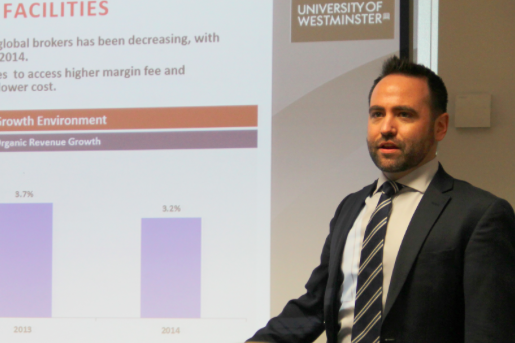On Thursday 17 March, Erik Johnson, Assistant Vice President of Allied World Assurance gave a guest talk to the students of Finance, Banking and Insurance MSc at Westminster Business School on invitation by Senior Lecturers Dr Simone Krummaker and Dr Stefan van Dellen.
Erik Johnson is an accomplished insurance professional with 14-years of industry experience. With a portfolio that includes strategy consulting at Deloitte, strategy at Lloyd’s, and corporate development at Allied World, he was an excellent choice of speaker for our students. Having visited Lloyd’s headquarters last November, everyone on the programme is fully aware of the importance of this insurance market and were eager to find out more from their former Strategy Manager.

The lecture: talking about the insurance industry
Erik Johnson’s lecture focused on the major structural challenges facing the insurance industry with the London market at the heart of it. The insurance industry is very proud of some of its traditions and rituals and even though their business models are being constantly questioned, Lloyd`s of London and other insurers are slowly embracing the opportunities of advances in technology. For a couple of centuries now, for example, brokers come to Lloyd’s along with “slips” and waited in the line to be served by underwriters. This is what it looked like in 17th century and so it is largely the same in the 21st century. The world could only dream of the steam engine in the 17th century, in 21th the combustion engine is almost on the verge of extinction and is replaced with new fully-electric Teslas. In Lloyd`s some processes are still the same as the 1700s, with all of its merits and drawbacks.
This is about to change, as new competitors with new products and are entering the market. New technology and distribution arrangements now allow insurers to invest in ready-made risk portfolios. An idea which reminds us of the banking industry with portfolios and securitization. Similar approaches were tried in insurance in the 1980s, but it didn’t work out due to the lack of portfolio transparency, largely driven by a lack of computer processing capacity and limited analytics abilities. The computational power of contemporary computers is huge and they can now provide better transparency of what makes up large portfolios of insurance risks, how to manage them, and how to price them.
Erik Johnson also stressed that the dominance of the largest 3 brokers in the London insurance market is strong. AON, Willis and Marsh control circa 80% of some segments of the London insurance market. There is growing market concentration, which enables top brokers to invest in better data and analytics. It is estimated that AON has spent over $1 bn on its flagship data and analytics systems. These resources combined with best data analytics talent helps brokers price risks even better than some smaller insurers. It is not a rarity that brokers are suggesting prices to insurance underwriters, with brokers removing much of the margin for negotiation. Some market watchers see a future where insurance companies face the risk of becoming nothing more than capital suppliers with brokers dominating pricing and distribution.
Thank you
The lecture was packed full of surprising information. I believe that it made us even more aware of the ongoing changes in the insurance industry. Undeniably, it is the best time to work in insurance and I believe Erik Johnson did an excellent job of encouraging us to do so.
Many thanks to Finance, Banking and Insurance MSc student, Piotr Piekarski for this guest blog. To find out more about the course please click here
Latest posts by Jeni Stokes
(see all)

